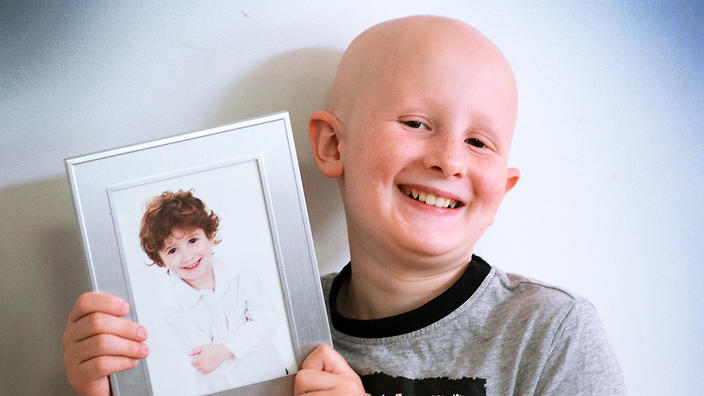Bald from age seven, Oscar is a poster-boy for cool acceptance in a world in pursuit of luscious locks.
Hair is big business, worth around $4.5 billion to Australia’s economy. Supermarkets and pharmacies devote complete aisles to the pursuit of luscious locks, tremendous tresses and magnificent manes. Late-night advertising bombards men with miraculous hair-growth products, procedures and potions preying on the hyped-up morbid fear of going bald.
Perhaps it’s time to take a tip from someone who has mastered a crisis that went way beyond the average bad hair day.
In May 2014, seven year old Oscar was at school, busy completing his daily maths sheet when a few hairs dropped onto his work. Two days later, his parents Charmaine and Nick, noticed two small bald patches on his scalp. Seven days later all of Oscar’s thick chestnut curls were gone.
His parents frantically searched online for answers, fearing that his hair loss was a sign of a dreaded disorder. Oscar embarked on a seemingly never-ending round of doctor’s visits, blood tests, specialists and treatments.
A month later, Oscar lost his eyebrows and eyelashes and a diagnosis was confirmed: Oscar had Alopecia Areata Universalis, the rarest type of alopecia, involving the complete loss of body hair.
“From my research, I also knew this was the hardest type of alopecia to treat with current therapies,” Charmaine said, adding that current steroid-based treatments are unreliable and plagued by side effects.
Alopecia Areata Universalis (AU) is thought to be an auto-immune disorder, where the immune system mistakenly attacks hair follicles and fingernails.
Approximately 1 in 125,000 people will get AU and it can occur at any age, with males twice as likely to get the condition.
Roughly 20% of people with the condition have a family member with alopecia and its onset in those pre-disposed is probably triggered by an environmental factor.



Family time with parents, Charmaine and Nick, and siblings, Archie and Erin.
Charmaine and Nick admit that, in hindsight, the speed at which Oscar lost his hair was a blessing. “We didn’t really have time to dwell on things because it all happened so fast. When we found out it wasn’t cancer it was such a relief,” Charmaine said.
Nick added, “You get your own ability to cope when you see your own kid shows such maturity dealing with his condition.”
Charmaine said that the best advice she received was from paediatric dermatologist Dr Linda Martin when it became evident that it was unlikely that Oscar’s hair would grow back.
“Take care of his soul,” Martin said, and with the aid of some sessions with a child psychologist, Oscar and family are moving on together.
“It’s become our new normal and we’ve all adjusted,” Charmaine said.
On first meeting, many people assume that Oscar’s hairlessness is from cancer treatment which in itself has its own challenges.
“You get pretty tired of always telling people,” Oscar rolls his eyes and parrots: ‘No, I don’t have cancer, No, you can’t catch it. No, I don’t know if it’ll grow back.”
Another challenge for Charmaine and Nick will be familiar to any family with a ‘different’ kid: with so much focus on Oscar, younger siblings, Archie and Erin have naturally been prone to the occasional attention-seeking behaviours.
“That’s pretty normal I think,” said Nick. “When all this happened we may have gone a bit over the top with attention to Oscar but it’s all settling back down a bit now.”

Oscar organised a ‘Crazy Hair Day’ at school to raise awareness and funds for Alopecia Areata.
Oscar organised a ‘Crazy Hair Day’ at his school in November last year to raise awareness and funds for Alopecia Areata, and his school friends helped promote the cause with posters and advertising. The whole school – teachers included – turned up sporting hairspray, wigs and crazy hair styles.
School Principal Clint White said, “Not only did the event raise over $400, it more importantly built self-esteem and awareness of the adversity that one of our students face each day. The support of the students and parents was amazing.”
Eighteen months after losing his hair Oscar is determined to not let his lack of hair define him.
Apart from the usual stares from strangers and the constant application and re-application of sunscreen, Oscar says Alopecia comes with its own benefits.
“It gets a bit boring explaining my condition but the lady at the shop always gives me a free chocolate and when I play soccer the guys on the other team don’t try to tackle me as hard.”
Oscar loves drumming and plays in the school band as well as a small rock combo that has played at a few parties and at a local club.
“I think I’d like to be a musician when I get older,” Oscar reflected. “People kind of expect you to look a bit different if you play in a band.”
The Australian Alopecia Areata Foundation offers information and resources for people with dramatic hair loss and their carers. Visit www.aaaf.org.au for more info.
Words and photography by Brendan Fitzpatrick
Published 8 January 2016 at: http://www.sbs.com.au/topics/life/health/article/2016/01/08/bald-and-beautiful
